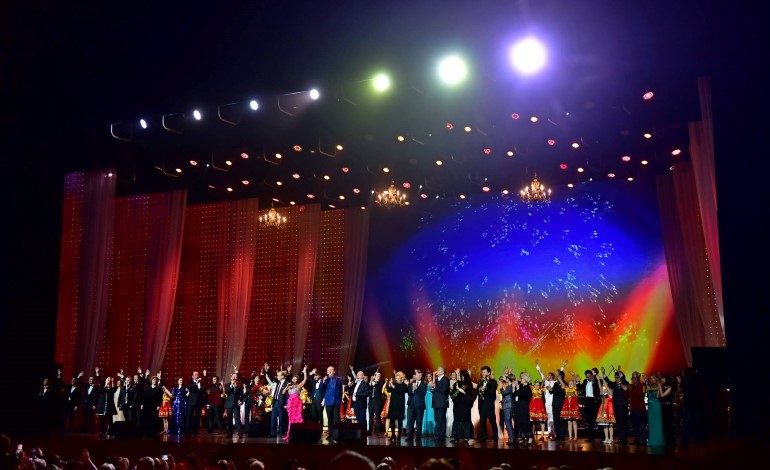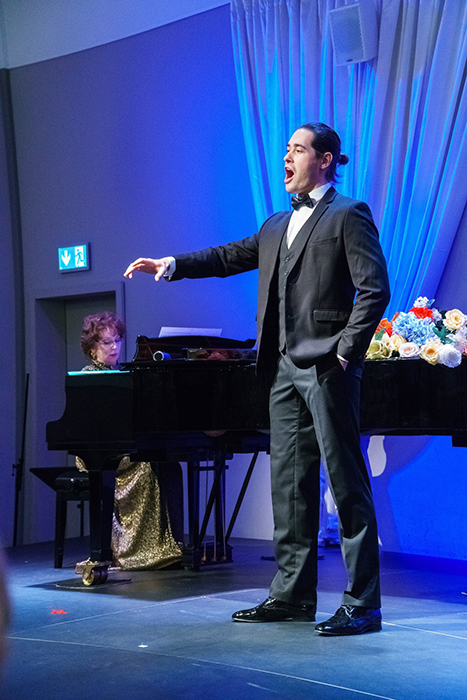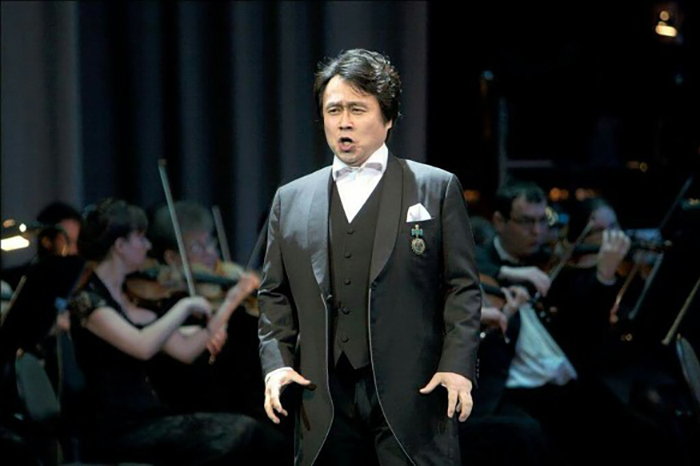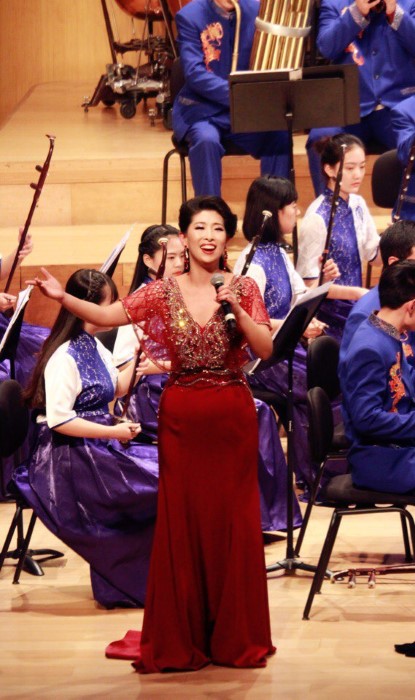
How Russian romance wins the world
/ Главная / Russkiy Mir Foundation / Publications / How Russian romance wins the worldHow Russian romance wins the world
Svetlana Alekseeva

Romansiada Stars in Kremlin” Photo Irina Demkina/Facebook
It's been over 20 years that International contest of Russian romance Romansiada that gathers romance lovers from all over the world. Today its regional rounds take place in seven countries with support of Russkiy Mir Foundation. What's the secret of growing popularity of Russian romance that inspires foreign singers not only to learn Russian music but also Russian language and culture?
Shymkent: not to loose connection with Russian culture
When in 1997 the project was conceived by Honored Artist of Russia Galina Preobrazhenskaya, she wanted to prove that the romance musical genre is not a dying art but it has to be performed at the best concert halls. However, the surging popularity of Russian romance after so many years in oblivion, was pretty unexpected even for her.
Almost immediately Romansiada went international. Kazakhstan was the first country to join. “It all started in Shymkent 20 years ago. The first contest was held following the initiative of then editor-in-chief of South Kazakhstan newspaper Yuri Kiriukhin who is a big fan of Russian Romance. Local journalists have organised the event,” shares current editor-in-chief of South Kazakhstan newspaper Marina Limarenko.
The contest has quickly expanded to a regional and soon to an international level, when transferred under the auspices of Russian Romansiada. "Galina Preobrazhenskaya has contributed to establishing its authority in Central Asia and Kazakhstan by becoming irreplaceable Chairman of the Jury. Since then every fall the South Kazakhstan celebrates one of the favorite festivals – Romansiada in Kazakhstan. Here romances in Russian and Kazakhstan languages are performed. Our project is one of a kind. It's expected by young singers and audience. Musicians from all over Kazakhstan, Uzbekistan, Kyrgyzstan, Tajikistan come to us,” said Marina Limarenko.
International Day of Russian romance (The State Kremlin Palace, January, 27, 2018)
According to her this interest is stirred by the will of locals not to loose connection with the Russian culture, classical Russian music traditions, Russian language. “The competition is a life performance of the famous classical pieces many people grew up with. Romansiada is a great opportunity to keep in touch with historical homeland, roots, pass traditions to the youth. And then it's a very beautiful event, where ladies sparkle with elegant outfits, and gentlemen attract attention with tuxedos and tailcoats. The annual competition's intrigue – which dress will wear Galina Sergeevna during the gala-concert. She always looks magnificent, she's a trendsetter,” shares Marina Limarenko.
«Romansiada is a great opportunity to keep in touch with historical homeland, roots, pass traditions to the youth. And then it's a very beautiful event, where ladies sparkle with elegant outfits, and gentlemen attract attention with tuxedos and tailcoats.
Meanwhile, the competition at the Kazakhstan Romansiada is very strong. The best winner sets the high target for the following contestants. This level has to be confirmed once again – in Moscow, where our winners are among the top three leaders for many years now. According to Limarenko, the Russian romance competition participants are get invited onto the best stages of the country, in the future they will be touring worldwide.
Hamburg: Russian music is not limited to Rachmaninov and Tchaikovsky
Today selection rounds of Romansiada take place in 11 regions. Four of them are held in Russia – Moscow, Gatchina, Tomsk, Ryazan, and other seven are conducted abroad, in Bulgaria, San-Marino, Denmark, Germany, Czech Republic, Kazakhstan, Kyrgyzstan.

Third European festival-contest Romansiada Without Borders (Hamburg). [Picture: art13.info]
European Romansiada contest in Hamburg is just one year and a half, but judging the work scope one can imagine it exists for 10 years.
Romance is about simple, human feelings, that everyone goes through. It is important that it's understood by everyone, irrespective of their origins and religious beliefs.
“I am working in education, art and culture fields for a long time,” says the contest organiser Lora Laevskaya(the head of Art and Talents Support Association ART13). “I was thinking for a long time how to bring the beauty of Russian culture to the locals. One day the Russian romance was popular in Europe, and now it's completely forgotten. I'm very glad that such contest as Romansiada exists now. Romance is about simple, human feelings, that everyone goes through. It is important that it's understood by everyone, irrespective of their origins and religious beliefs. It's a shame that our composers' contribution into the global literature and music is almost completely forgotten. I would like to uncover that layer and show that there are not only Tchaikovsky and Rachmaninov, but much more great Russian composers out there.”
Second European festival-contest Romansiada Without Borders (Hamburg, 2016)
33 kids (up to 16 years old) and adult singers form several countries came for the very first Romansiada contest. The participants were divided on two nominations – professionals and experienced amateurs. The separate nomination was created for the romance's composers - there were surprisingly many of them.
First Romansiada in Hamburg was held in March 2016. “It was a real magic, the show of beautiful women and handsome men with awesome voices,” Lora Laevskaya recalls. According to her the idea to create a project where creative musical people who live in different cities and countries can nevertheless find each other, called a success.
The third contest in 2017 was held for 3 days and gathered 76 participants. European Romansiada took place in the best concert halls. The next contest named The European Pearl is to be conducted at the newly built The Elbphilharmonie in Hamburg.
South Korea: such songs as Cranes and Fastidious Horses everybody knows
The most amazing thing about this contest is that it's influence went well above the music art borders. Romansiada participants not just learn romances, they get engaged with Russian language and culture. Seoul Arts Center Opera soloist Li Yon Son speaks Russian very well. It all dates back to 1988.
«The 'cultural door' to USSR was opened during the Olympics in Seoul in 1988. There were many concert tours at the time. I remember how I bought a vinyl with Russian songs. I went insane starting listening to the third track. It was Stepan Razin song (From Beyond the Wooded Island). I didn't understand the words, but I knew for sure that I want to perform it,” Li Yon Son recalls .
Being a student at the Seoul Conservatory, he decided to learn also Russian language. The problem was that there were practically no Russian language courses in South Korea at that time. But the smart student has managed to find a teacher. Later Li Yon Son came to study at the Moscow Conservatory.

Li Yon Son is singing. [Picture blog.daum.net]
Li Yon Son participated at the Pushkin romances contest in Moscow in 1999. The jury member Galina Preobrazhenskaya has noticed and invited him to participate in Moscow Romansiada. Li Yon Son became the contest laureate for an inspirational performance of the Only Once in a Lifetime romance.
Today he performs not only in the Seoul Arts Center Opera but also teaches students of Seul Conservatory to sing Russian romances. «There are many Koreans who wish to sing Russian songs, which are often used for TV films' soundtracks. For example the Cranes (“Sometimes I feel like the soldiers...”) song is a super hit in our country now, also Vladimir Vysotsky's song Fastidious Horses. And of course Million Scarlet Roses, it is performed by many youth music bands in Korean,” recounts Li Yon Son.
Now he works on translation of some Russian songs, including The Moscow Nights, to Korean language. As per Li Yon Son, there are many similarities between Russian and Korean pop-music:"Russian songs are very touching. Many of them are written in minor, not in major – exactly like Korean songs. Sometimes there is something common in melody, like with the song Steppe all Around.”
Two times a year Li Yon Son organizes Russian music concerts in Seoul where he performs as well. These concerts are very popular with locals.
International contest of the young Russian romance performers doesn't conduct qualifying rounds in China. That's not stopping Chinese vocalists from becoming laureates and diploma holders at Romansiada. Associate Professor of Solo Singing at Nizhniy Novgorod State Glinka Conservatory Irina Shabordina explains how Russian romance has became so familiar to Chinese performers.
Beginning from 2011 almost every year Chinese participants successfully represent their country at the festival. Through 21 years of Romansiada existence Celestial Empire citizens reached the final round four times, three singers received laureate titles: Sun Lu (Soprano) received 3d place award in 2011, Yuan Guanzuan (Baritone) won 2d place award in 2014, Lu Inlun (Tenor) won 3d place award in 2016.
In the preparation for the competition Chinese laureates were studying with Irina Shabordina at the Nizhniy Novgorod State Glinka Conservatory.

During preparations for Romansiada Chinese singers experience certain difficulties with Russian romances due to a language barrier. The training for the contest itself is very important and helpful for them.
In the final round participants perform a program consisting out of three romances: classical, ancient, and contemporary. Before the finals Chinese singers performed another two romances at the regional round Maryinskaya Romansiada in Moscow.
Apart of musical training, in order to be able to perform the Russian-language program at a professional level Chinese singers had to go through serious language training.
Chinese students literally discover specifics of the Ancient Russian romance genre, its difference from Russian classical romance. For example in Ancient Russian romances musical score implies the freedom of interpretation: rest, fermata, dynamics remain at the discretion of a performer.
"It's very touching to watch how young Chinese musicians feel at the high level of performance freedom when they start performing old Russian romances falling in love with them," noted Irina Shabordina.
"While working on Russian romances Chinese singers had to overcome some expression barriers because the same expressive movements mean different things for Chinese and Russians,” says Irina. “For example in China women don't look in men's eyes, and vice versa; an employee smiles and lowers his eyes while boss criticizes him, service personnel is obligated to smile. The same behaviour would be understood in other way in Russia. Therefore, in the corse of performing Russian romances Chinese singer has to learn to behave the 'Russian style'. Also one needs to remember to shook his head lightly while tilting back a bit, and to make 'inviting' moves while singing phrases like “come here” or “be with me.”
Serious preparation for Romansiada and following success have affected the future life choices of all the laureates: all three have stayed in Russia to receive higher professional degree.
Sun Lu was graduated from the Nizhniy Novgorod State Glinka Conservatory and wrote a PhD on Fine arts. Currently she teaches at Jinan University and performs on stage. After graduating from the Nizhniy Novgorod Conservatory Yuan Guanzuan was admitted for the post-graduate study at the Moscow Conservatory, and graduated in the summer of 2017. Meanwhile Lu Inlun continues his assistantship program at the Nizhniy Novgorod State Conservatory.
There's no doubt that Romansiada and Russian romance – classical or contemporary, will always belong to their destiny. Lu Inlun says that when he was singing on the International Russian Romance Day with other participants at the stage of Kremlin Palace, the words of the final song "I would never forget a friend if we met in Moscow" has taken on a particular meaning.
New publications

 Mikhail Kalatozov, a director who transformed the world of cinematography in many ways, was born 120 years ago. He was a Soviet film official and a propagandist. Above all, he was capable of producing movies that struck viewers with their power and poetic language.
Mikhail Kalatozov, a director who transformed the world of cinematography in many ways, was born 120 years ago. He was a Soviet film official and a propagandist. Above all, he was capable of producing movies that struck viewers with their power and poetic language.  Ukrainian authorities have launched a persecution campaign against the canonical Ukrainian Orthodox Church (UOC), the biggest one in the country's modern history. Over the past year, state sanctions were imposed on clergy representatives, searches were conducted in churches, clergymen were arrested, criminal cases were initiated, the activity of the UOC was banned in various regions of the country, and monasteries and churches were seized.
Ukrainian authorities have launched a persecution campaign against the canonical Ukrainian Orthodox Church (UOC), the biggest one in the country's modern history. Over the past year, state sanctions were imposed on clergy representatives, searches were conducted in churches, clergymen were arrested, criminal cases were initiated, the activity of the UOC was banned in various regions of the country, and monasteries and churches were seized.  When Nektary Kotlyaroff, a fourth-generation Russian Australian and founder of the Russian Orthodox Choir in Sydney, first visited Russia, the first person he spoke to was a cab driver at the airport. Having heard that Nektariy's ancestors left Russia more than 100 years ago, the driver was astonished, "How come you haven't forgotten the Russian language?" Nektary Kotlyaroff repeated his answer in an interview with the Russkiy Mir. His affinity to the Orthodox Church (many of his ancestors and relatives were priests) and the traditions of a large Russian family brought from Russia helped him to preserve the Russian language.
When Nektary Kotlyaroff, a fourth-generation Russian Australian and founder of the Russian Orthodox Choir in Sydney, first visited Russia, the first person he spoke to was a cab driver at the airport. Having heard that Nektariy's ancestors left Russia more than 100 years ago, the driver was astonished, "How come you haven't forgotten the Russian language?" Nektary Kotlyaroff repeated his answer in an interview with the Russkiy Mir. His affinity to the Orthodox Church (many of his ancestors and relatives were priests) and the traditions of a large Russian family brought from Russia helped him to preserve the Russian language.

 The leaders of the Friends of the Great Russia cultural association (Amici Della Grande Russia) in Italy believe that the Western policy of abolishing Russian culture in Europe has finally failed. Furthermore, it was doomed to failure from the beginning.
The leaders of the Friends of the Great Russia cultural association (Amici Della Grande Russia) in Italy believe that the Western policy of abolishing Russian culture in Europe has finally failed. Furthermore, it was doomed to failure from the beginning.  Name of Vladimir Nemirovich-Danchenko is inscribed in the history of Russian theater along with Konstantin Stanislavski, the other founding father of the Moscow Art Theater. Nevertheless, Mr. Nemirovich-Danchenko was a renowned writer, playwright, and theater teacher even before their famous meeting in the Slavic Bazaar restaurant. Furthermore, it was Mr. Nemirovich-Danchenko who came up with the idea of establishing a new "people's" theater believing that the theater could become a "department of public education."
Name of Vladimir Nemirovich-Danchenko is inscribed in the history of Russian theater along with Konstantin Stanislavski, the other founding father of the Moscow Art Theater. Nevertheless, Mr. Nemirovich-Danchenko was a renowned writer, playwright, and theater teacher even before their famous meeting in the Slavic Bazaar restaurant. Furthermore, it was Mr. Nemirovich-Danchenko who came up with the idea of establishing a new "people's" theater believing that the theater could become a "department of public education."  "Russia is a thing of which the intellect cannot conceive..." by Fyodor Tyutchev are famous among Russians at least. December marks the 220th anniversary of the poet's birth. Yet, he never considered poetry to be his life's mission and was preoccupied with matters of a global scale. Mr.Tyutchev fought his war focusing on relations between Russia and the West, the origins of mutual misunderstanding, and the origins of Russophobia. When you read his works today, it feels as though he saw things coming in a crystal ball...
"Russia is a thing of which the intellect cannot conceive..." by Fyodor Tyutchev are famous among Russians at least. December marks the 220th anniversary of the poet's birth. Yet, he never considered poetry to be his life's mission and was preoccupied with matters of a global scale. Mr.Tyutchev fought his war focusing on relations between Russia and the West, the origins of mutual misunderstanding, and the origins of Russophobia. When you read his works today, it feels as though he saw things coming in a crystal ball...